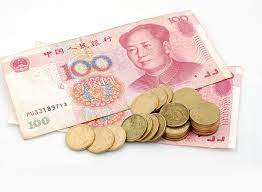Muhammad Asif Noor
The global economic and political landscape is undergoing a profound shift of power, with a notable transition from the Western Hemisphere to the East and from the North to the South. This transformation is most salient in the realm of international currencies, where the once-unquestioned dominance of the United States dollar is facing substantial challenges from emerging and developing economies. In the midst of this evolving paradigm, the Chinese renminbi (RMB), commonly known as the yuan, has emerged as a potent contender poised to challenge the dollar’s established supremacy.
The ascendancy of the United States, both economically and politically, in the post-World War II era solidified the dollar’s role as the world’s primary reserve currency. Nevertheless, recent decades have witnessed a dramatic shift in this narrative. The dollar’s share of international reserves, which peaked at approximately 70% in 2000, has steadily eroded, declining to roughly 59% by 2022. This decline underscores a significant shift in the dollar’s dominance within the global financial landscape.
Furthermore, several nations have taken measures to reduce their holdings of U.S. Treasury Securities, with China leading the way. China’s holdings, which once exceeded $1.3 trillion in 2013, have dwindled to $835 billion by June 2023. This trend signifies a strategic shift away from the dollar as a preferred store of value. This move has been catalyzed, in part, by the use of U.S. economic sanctions and the weaponization of the dollar in international diplomacy.
The weaponization of the dollar, primarily through the imposition of economic sanctions, has prompted numerous countries to explore alternative currencies for international transactions. The application of sanctions against countries like Cuba, North Korea, Iran, Venezuela, and Russia has engendered a growing reluctance to rely solely on the dollar.
Despite these developments, the dollar retains its dominance in various aspects of international finance, including trade invoicing, cross-border loans, and foreign exchange transactions. However, some nations are actively seeking to reduce their dependence on the dollar. Russia, for instance, has significantly diminished its use of the dollar in trade with China, with just 22.7% of Russian exports to China settled in dollars by 2020, down from over 95% in 2013.
China embarked on its journey to internationalize the RMB in 2009, marked by the first cross-border settlement in yuan. Over the past decade, a foundational framework for international usage has been established, including RMB clearance banks, offshore RMB markets, and the liberalization of the domestic financial market.
A discernible global trend known as “de-dollarization” has been gaining momentum. Countries are actively seeking alternatives to the U.S. dollar, responding to its recurrent deployment as a financial weapon and sanctions tool in recent geopolitical conflicts. Additionally, the aggressive monetary tightening measures adopted by the U.S. Federal Reserve, characterized by short-term, frequent, and large-scale interventions, have led to heightened volatility of the U.S. dollar, unsettling the global capital market. In stark contrast, the RMB has maintained stability thanks to China’s prudent macroeconomic policies, consistent economic growth, lower inflation rates, and steadfast outbound investment. This stability has reinforced the RMB’s credibility on the global stage.
With Europe and the United States facing tightening credit environments, the financing value of the RMB has become increasingly apparent. Central banks diversifying their foreign exchange reserves are expected to raise the RMB’s weighting as a reserve currency. Notably, in 2022, the International Monetary Fund augmented the RMB’s weighting in the Special Drawing Rights basket, further reflecting its growing significance in international finance.
However, experts concur that there is more work to be done to enhance the RMB’s international prominence. Despite being the fifth most active currency for global payments by value, the RMB holds a modest 2.19% share of the global market. To bolster its internationalization, deeper integration with initiatives such as the Belt and Road Initiative is recommended. Strategies include promoting bilateral settlements in local currencies for commodities trade, developing additional yuan-denominated green finance products, and establishing a multilateral bridge to facilitate central bank digital currencies among Asian economies, all contributing to the RMB’s continued ascent on the global financial stage.
In addition to these measures, China must cultivate a robust and diverse capital market offering various yuan-denominated assets to incentivize foreign investors to hold and trade in yuan-based assets. Simultaneously, maintaining transparent and stable monetary policies remains paramount to instill confidence in the RMB.
China’s active involvement in institutions such as the Asia Investment and Infrastructure Bank (AIIB) and the New Development Bank (BRICS Bank) augments its influence in international finance. These institutions provide alternative financial infrastructure to the Western-dominated traditional system, thereby fostering the utilization of the yuan.
While the dollar’s dominance continues to exert a significant influence, the global economic landscape is undeniably evolving. China’s strategic efforts, encompassing the liberalization of capital movement, increased yuan convertibility, and transparent monetary policies, represent pivotal steps toward internationalizing the RMB. China’s active participation in institutions like the AIIB and BRICS Bank, alongside its expanding lending activities, contributes to the growing utilization of the yuan.


